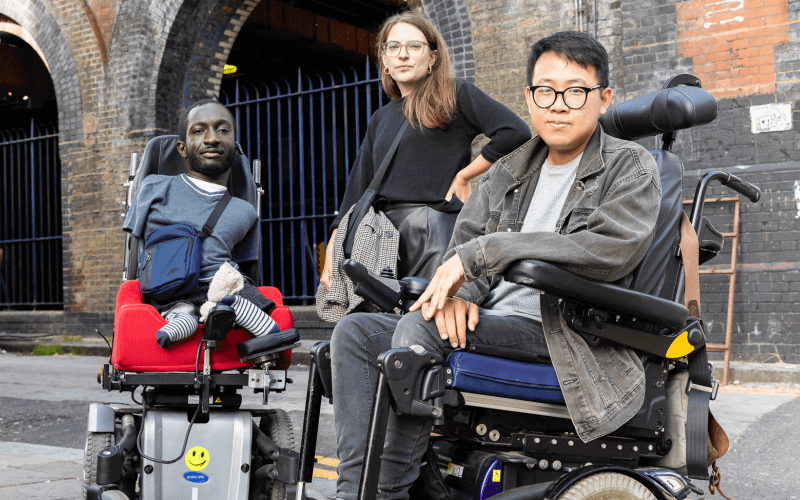A major new report says the current state of disabled transport is “unfair and unacceptable” and that the Government’s commitment to providing “equal access for disabled people” by 2030 has “stalled”.
The report, “Are We There Yet?”, published yesterday (Wednesday) by disability people’s organisation (DPO) Transport for All, shows that access barriers are “pervasive” across all modes of transport and at every stage of the journey.
The report details the findings of a survey carried out in 2022 and 2023, which asked more than 500 disabled people in England about the journeys they took between September 2021 and September 2022.
This includes public transport (bus, train, tram, subway, light rail), personal transport (car, taxi, hire car) and active travel (walking, car, bicycle).
Transport for All (TfA) said in its report that disabled people make far fewer journeys than able-bodied people, making just 5.84 journeys per week on average – just a third of the national average of 17 journeys per week.
However, people with disabilities who want to travel more said they would make an average of 10.84 trips per week if transport was fully accessible.
Nearly half of respondents (44%) said they believe transport and road accessibility will get worse over the next decade, while only 28% believe it will improve.
On buses, 51% of respondents experienced issues with priority seating and space, such as seats being filled, seats not being clearly defined, or there being too few seats.
For trains, cost was the most frequent barrier to travel, with 65 percent of respondents saying this had been a barrier in the past 12 months, while 49 percent reported crowded trains or stations and 43 percent pointed to a lack of step-free access or step-free entrances and exits.
For taxis and hire cars, the most common barrier was still cost (64% of respondents), but more than a third (34%) said there weren’t enough wheelchair-accessible vehicles, and 29% pointed to negative attitudes from drivers.
One wheelchair user said: “Despite being booked specifically for wheelchair users, the taxi arrived with the ramp broken.”
“I missed my appointment and had to reschedule, which meant I had to wait another five months for urgent care. I felt angry and upset.”
Seven in ten survey respondents (71%) said they would like to use greener modes of transportation – such as walking, driving, cycling or taking the bus – more often but are prevented from doing so by poor accessibility or availability.
TfA said that because transport produces more greenhouse gas emissions than any other sector of the UK economy, investment in accessible public infrastructure is “crucial to tackling the climate crisis and removing barriers could make millions of journeys each year sustainable”.
Nearly two-thirds (62%) of respondents said they need to plan every journey to stay safe, but that the information they need to do so is often unavailable, inaccurate or inaccessible.
Additionally, 77 percent of respondents said that poor pavement surfaces had made walking or wheelchair mobility difficult in the past 12 months, including issues such as bumps, holes, tree roots, broken tiles and narrow widths.
This was the most frequently cited barrier of all transportation modes.
One respondent said: “The road to the nearest bus stop is in a terrible state. The poor pavement broke my wheelchair and I almost fell off.”
“I have to take a different route which takes twice as long to get to the bus stop. Plus, my wheelchair is broken.”
Among its many recommendations, the report calls for the government to investigate why progress has stalled towards the 2030 target of “equal access for people with disabilities” set out in the 2018 Comprehensive Transport Strategy.
It also calls for “meaningful” engagement by governments and transport agencies with disabled people and disability organisations, the creation of a new regulator to enforce the right to accessible transport under the Equality Act and collect data on compliance, and targeted investment in “accessible and reliable public transport options”.
The report also calls for “significant and immediate changes in the approach to disability travel incentives, overhauling eligibility criteria and standardising incentives across all modes of transport to ensure fairness and equity.”
Caroline Stickland, chief executive of TfA, said: “It is unacceptable that millions of people are unable to get out and see their loved ones, or access work, education or healthcare because of poor transport links.”
“It is now up to decision-makers to listen to our experiences and remove the discriminatory barriers that hold our community back.”
Pictured: Caroline Stickland with two accessible transport campaigners. Photo by Shauna Louise
Editor’s note:
Please consider making a voluntary donation to support DNS’ work and enable us to continue producing independent, carefully researched news stories focusing on the lives and rights of disability people and disability-led organisations.
If you cannot afford to donate, please do not donate. Please note that DNS is not a charity. Since its launch in April 2009, DNS has been run and owned by disabled journalist John Pring.
If you can help support the DNS effort, we’d really appreciate it.

